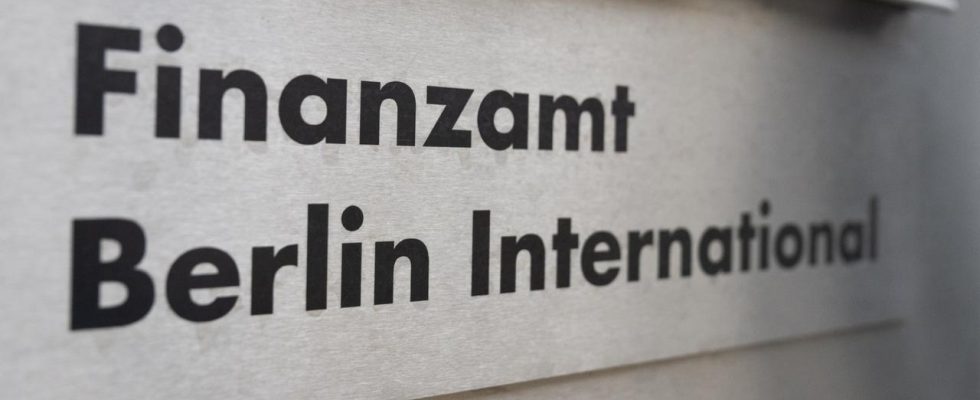The Berlin International Tax Office was founded just over a month ago. It is intended to ensure that multinational corporations without headquarters in Germany pay sales tax here. How’s that working?
Every beginning is difficult. Nicole Santo Berg, a newly trained clerk at the new Berlin International tax office, also had to feel this. A lot of the companies whose documents she has to check come from China, she said at the beginning of December on the day the authority officially launched. “What’s the first name, what’s the last name? That’s a little challenging for someone who hasn’t had any experience with it.” All data must be transferred manually; there was no automatic synchronization of incoming emails at the time.
The tax office has now been at work for a good month. It is centrally responsible for the whole of Germany for companies from more than 100 countries that trade in this country but do not have their headquarters here. The majority of them are online retailers who sell their goods on trading platforms such as Amazon, eBay or Temu. The new authority is intended to ensure that such international companies cannot evade their obligation to pay sales tax in Germany.
Mainly targeting online retailers from Asia
How is the work of the international tax collectors going so far? The responsible Berlin Finance Senator Stefan Evers, CDU, is satisfied. “We can already see that the new structure is proving its worth,” he says. “It was the right decision to set up an independent tax office organizationally.”
By Christmas, around 2,000 international companies had submitted applications to register for VAT and around 1,000 of them had been registered. For comparison: 25,600 registration applications were submitted in 2022, an average of around 2,100 per month. Some of their processing dragged on until 2023.
According to the Berlin tax administration, a total of more than 115,000 foreign companies are registered with the International Tax Office, more than 110,000 of which are based in Asia – in the People’s Republic of China, Hong Kong, Macau and Taiwan. Previously, a department in the Berlin-Neukölln tax office was responsible for them, but was overwhelmed by the constantly growing number of applications.
The number of companies increased tenfold within five years
Since 2019, the number of companies registered for tax purposes has increased tenfold. The establishment of an independent authority has therefore become necessary, says Finance Senator Evers. The reason for this: a reform of the sales tax law, which obliges the operators of online trading platforms to cooperate with the tax authorities.
“The platforms have to check with the tax authorities: Are my online retailers who trade via my platform correctly registered for tax purposes? Are they meeting their tax obligations in their ongoing business? If this is not the case, the platform operators are forced to block,” says Stephan Bennemann, Deputy Head of the Berlin International Tax Office. This would encourage online retailers to register properly and pay their tax liabilities.
Shortage of skilled workers as big Challenge
The stricter law prevents many traders from operating under the radar of the tax authorities, but it also increases the authorities’ workload enormously. The Berlin financial administration has therefore set itself the goal of increasing the authority to 250 employees by the end of the year – an ambitious plan given the shortage of skilled workers. Around 160 employees currently work at the Berlin International tax office.
“We know that the personnel situation in the public service is difficult. Nevertheless, we want to achieve our goal,” says Finance Senator Evers. “The applicant situation is good so far, we will be holding initial discussions in January.” The task profile at the new tax office is diverse and therefore interesting for many applicants. The employees have to verify documents from China or identify forgeries.
The majority of the current employees come from the former department at the Neukölln tax office. Around 20 employees were transferred from other Berlin tax offices.
More income than expected in 2023
The Berlin Finance Senator did not yet want to give a forecast for the income of the new tax office. “Revenue depends on many factors, such as global market events or customer behavior in online trading. That’s why we can’t give a specific figure at this point,” says Evers. “However, we expect higher income than we still had at the Neukölln tax office.” The Neukölln tax office collected taxes amounting to 300 million euros annually.
The Tax Justice Network, which advocates for a tax policy oriented towards the common good, welcomes the reform of the Berlin tax office. “Now there is a little more staff, a better work structure and therefore a little less fraud and more consistent enforcement of the major reforms of the past,” says Christoph Trautvetter, a consultant at the Tax Justice Network. It may not be a major breakthrough in terms of tax justice, but it is a necessary step in a whole series of improvements.
The fact that clerks like Nicole Santo Berg still have to enter a lot of data by hand is unlikely to change any time soon. The IT modules for administration are developed jointly by all federal states, and the requirements for the international tax office are special, according to the Senate Department of Finance. “If a document comes from abroad as a PDF with completely different fonts, it is difficult to do this with software that is supposed to work for all tax offices,” says Finance Senator Evers. So the employees have to continue typing for now.

